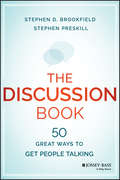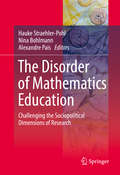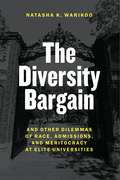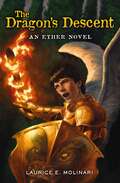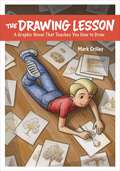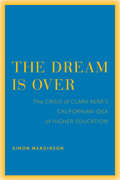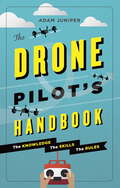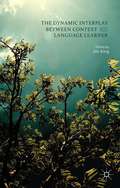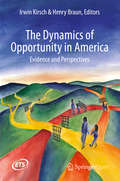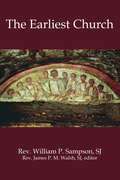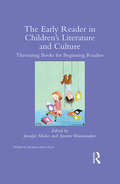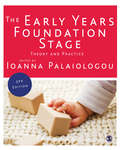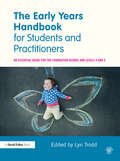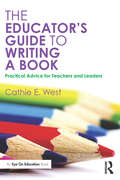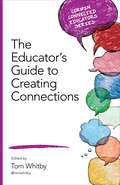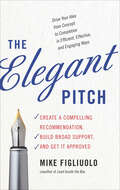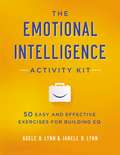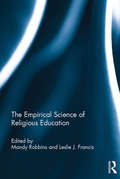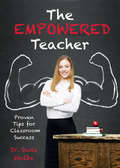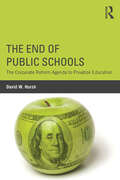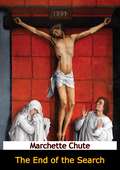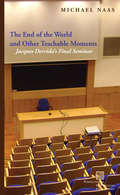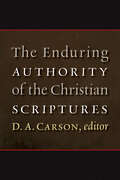- Table View
- List View
The Discussion Book
by Stephen D. Brookfield Stephen PreskillBuild teams, make better decisions, energize groups, and think out of the box Do you need a resource that you can pull out of your pocket to liven up meetings, trainings, professional development, and teaching? The fifty easily applied techniques in this timely manual spur creativity, stimulate energy, keep groups focused, and increase participation. Whether you're teaching classes, facilitating employee training, leading organizational or community meetings, furthering staff and professional development, guiding town halls, or working with congregations, The Discussion Book is your go-to guide for improving any group process. Each of the concrete techniques and exercises is clearly described with guidance on selection and implementation, as well as advice on which pitfalls to avoid. All of the techniques: Offer new ways to engage people and energize groups Get employees, students, colleagues, constituents, and community members to participate more fully in deliberative decision-making Encourage creativity and openness to new perspectives Increase collaboration and build cohesive teams Keep groups focused on important topics and hard-to-address issues Derived from the authors' decades of experience using these exercises with schools, colleges, corporations, the military, social movements, health care organizations, prisons, unions, non-profits, and elsewhere, The Discussion Book will help you guide discussions that matter.
The Disorder of Mathematics Education
by Hauke Straehler-Pohl Nina Bohlmann Alexandre PaisResearch within a socio-political paradigm or "turn" has been gradually recognized and institutionalized as an important part of mathematics education. This book focuses on the neglected problems, tensions and contradictions evoked by this process. The authors do this by challenging current regimes of truth about mathematics education; by identifying how recent technological developments challenge or suspend contemporary conceptions of mathematics education; by critiquing the ideological entanglement of mathematics, its education and schooling with capitalism; by self-reflective analyses of researchers' impacts on shaping what is and can be perceived as the practice of mathematics education (research); and by confronting main-stream mathematics education with socio-political contexts that are usually neglected. In this way, "mathematical rationality" becomes contextualized within contemporary society, where it reproduces itself through technologies, social practices, media and other spheres of social life.
The Diversity Bargain: And Other Dilemmas of Race, Admissions, and Meritocracy at Elite Universities
by Natasha K. WarikooWe’ve heard plenty from politicians and experts on affirmative action and higher education, about how universities should intervene—if at all—to ensure a diverse but deserving student population. But what about those for whom these issues matter the most? In this book, Natasha K. Warikoo deeply explores how students themselves think about merit and race at a uniquely pivotal moment: after they have just won the most competitive game of their lives and gained admittance to one of the world’s top universities. What Warikoo uncovers—talking with both white students and students of color at Harvard, Brown, and Oxford—is absolutely illuminating; and some of it is positively shocking. As she shows, many elite white students understand the value of diversity abstractly, but they ignore the real problems that racial inequality causes and that diversity programs are meant to solve. They stand in fear of being labeled a racist, but they are quick to call foul should a diversity program appear at all to hamper their own chances for advancement. The most troubling result of this ambivalence is what she calls the “diversity bargain,” in which white students reluctantly agree with affirmative action as long as it benefits them by providing a diverse learning environment—racial diversity, in this way, is a commodity, a selling point on a brochure. And as Warikoo shows, universities play a big part in creating these situations. The way they talk about race on campus and the kinds of diversity programs they offer have a huge impact on student attitudes, shaping them either toward ambivalence or, in better cases, toward more productive and considerate understandings of racial difference. Ultimately, this book demonstrates just how slippery the notions of race, merit, and privilege can be. In doing so, it asks important questions not just about college admissions but what the elite students who have succeeded at it—who will be the world’s future leaders—will do with the social inequalities of the wider world.
The Dragon's Descent (An Ether Novel)
by Laurice Elehwany MolinariEverything Vero has trained for in the Ether has led to this. In the third and final book of Laurice E. Molinari’s Ether series, the young guardian angel Vero is given the quest of locating the Book of Raziel—which was lost when Adam was forced to leave the garden of Eden. And not even Raziel himself knows where the book is now. It soon becomes clear, however, that Lucifer is intent on finding the book for his own means. When the C.A.N.D.L.E. library in the Ether is missing the information he needs, Vero, his sister, and his best friend, Tack, discover the clues to the book’s whereabouts may be right in front of them on Earth—and that Vero’s father’s new assignment in Sri Lanka may be no coincidence. As their quest begins in earnest, the lines between good and evil begin to blur. Vero will need to use every ounce of his training to take on not only the Devil and his hordes, but also Lilith, who may be lurking closer than anyone thinks.
The Drawing Lesson: A Graphic Novel That Teaches You How to Draw
by Mark CrilleyRead This Comic and Start Drawing Today! Nominated for a 2017 Eisner AwardFor the first time ever, drawing instructor and graphic novelist Mark Crilley brings his easy-to-follow artistic instruction to aspiring artists in the form of a comic book, providing you with a one-of-a-kind how-to experience. In The Drawing Lesson, you&’ll meet David—a young boy who wants nothing more than to learn how to draw. Luckily for David, he&’s just met Becky—his helpful drawing mentor. Page by page, Becky teaches David (and you!) about the essential fundamentals that artists need in order to master drawing, all in a unique visual format. In panel after panel, Crilley provides lessons on shading, negative space, creating compositions, and more, with accompanying exercises that you can try for yourself. Are you ready to start your drawing lesson today?
The Dream Is Over: The Crisis of Clark Kerr's California Idea of Higher Education (The Clark Kerr Lectures On the Role of Higher Education in Society #4)
by Simon MarginsonAt publication date, a free ebook version of this title will be available through Luminos, University of California Press's new open access publishing program. Visit www.luminosoa.org to learn more. TheDreamIsOver tells the extraordinary story of the 1960 Master Plan for Higher Education in California, created by visionary University of California President Clark Kerr and his contemporaries. The Master Plan's equality of opportunity policy brought college within reach of millions of American families for the first time and fashioned the world's leading system of public research universities. The California idea became the leading model for higher education across the world and has had great influence in the rapid growth of universities in China and East Asia. Yet, remarkably, the political conditions supporting the California idea in California itself have evaporated. Universal access is faltering, public tuition is rising, the great research universities face new challenges, and educational participation in California, once the national leader, lags far behind. Can the social values embodied in Kerr's vision be renewed?
The Drone Pilot's Handbook
by Adam JuniperThe perfect companion for anyone buying (or thinking of buying) a drone, whether it's just for fun, to race against friends, or to give their to give their photography a whole new angle.The Drone Pilot's Handbook gives you the skills and techniques you need to fly and maintain your multicopter drone, tips for tuning it for maximum performance, and - importantly - a clear graphical guide to where the law will and won't allow you to fly. Meanwhile, spectacular aerial photography from around the world will inspire you to get airborne immediately!Occasional boxouts provide safety tips, handy ideas, and URLs, and flying instructions are presented with attractive original illustrations. This clean approach that makes a welcome contrast to ugly online forums, or the PDFs that drone manufacturers provide, and will have you up and away in no time.
The Dynamic Interplay between Context and the Language Learner
by Jim KingThis edited volume offers a series of state-of-the-art conceptual papers and empirical research studies which consider how contextual factors at multiple levels dynamically interact with individuals to influence how they go about the complex business of learning and using a second language.
The Dynamics of Opportunity in America
by Irwin Kirsch Henry BraunAcross the country, our children are beginning life from very different starting points. Some have aspirations and believe they can be achieved. For too many others, aspirations are tempered, if not dashed, by the sobering realities of everyday life. These different starting points place children on distinctly different trajectories of growth and development, ultimately leading to vastly different adult outcomes. How did we get to a place where circumstances of birth have become so determinative? And what must we do, within communities and across our country, to better equalize opportunity for more Americans - both young and old? The editors of this volume contend that if, as a nation, we do nothing, then we will continue to drift apart, placing an unsustainable strain on the nation's social fabric and the character of its democracy. Consequently, understanding the dynamics governing the distribution and transmission of opportunity - and transforming this understanding into policies and programs - is critical for not only the life outcomes of individual Americans and their children, but also the country as a whole. The goal of Educational Testing Service's Opportunity in America initiative is to explore these powerful dynamics and to describe and convey them in a way that advances the national conversation about why we must take action - and how best to do so. This volume contains 13 chapters and an epilogue written by leaders from a range of fields including education, economics, demography, and political science. Collectively, they not only illuminate key aspects of the problem but also offer suggestions of what policies, programs, and changes in practices could begin to reverse the trends we are seeing. Written in an engaging style, this volume constitutes an essential foundation for informed discussion and strategic analysis.
The Earliest Church
by William P. Sampson“Exciting reading for anyone who wants to experience the initial development of Christianity as the work of humans essentially just like us.” —David Goldfrank, Professor of History, Georgetown University This book brings to life the lived experience of the disciples after Christ’s death, the possibilities they faced, and the choices they made—and how these all shaped the direction the Church would take. “In The Earliest Church, the late Rev. William P. Sampson, SJ, takes us on a journey of imagination, spirit, and theological contemplation. By helping us to explore the earliest days of the Church, he guides us into a deeper understanding of our Church in the present day. Just as Fr. Sampson guided so many on spiritual retreats, this book continues his legacy of scholarship, reflection, and helping others to most authentically live their faith.” —John J. DeGioia, President, Georgetown University “Applies a unique combination of historical and exegetical imagination and scholarly rigor to reconstruct the hypothetical journey of the direct and indirect disciples of Jesus from their considering him to have been an extraordinary man to their envisioning him also as God.” —David Goldfrank, Professor of History, Georgetown University “A fascinating exploration of how the religious experience continues to open up new insights into the past and the meaning of the Christian perspective. It provides a new analysis for readers seeking to know the history and contemporary unfolding of Christianity as seen in the early development of the church.” —Dr. Ronald Johnson, Professor Emeritus of History, Georgetown University
The Early Reader in Children's Literature and Culture: Theorizing Books for Beginning Readers (Children's Literature and Culture)
by Jennifer Miskec Annette WannamakerThis is the first volume to consider the popular literary category of Early Readers – books written and designed for children who are just beginning to read independently. It argues that Early Readers deserve more scholarly attention and careful thought because they are, for many younger readers, their first opportunity to engage with a work of literature on their own, to feel a sense of mastery over a text, and to experience pleasure from the act of reading independently. Using interdisciplinary approaches that draw upon and synthesize research being done in education, child psychology, sociology, cultural studies, and children’s literature, the volume visits Early Readers from a variety of angles: as teaching tools; as cultural artifacts that shape cultural and individual subjectivity; as mass produced products sold to a niche market of parents, educators, and young children; and as aesthetic objects, works of literature and art with specific conventions. Examining the reasons such books are so popular with young readers, as well as the reasons that some adults challenge and censor them, the volume considers the ways Early Readers contribute to the construction of younger children as readers, thinkers, consumers, and as gendered, raced, classed subjects. It also addresses children’s texts that have been translated and sold around the globe, examining them as part of an increasingly transnational children’s media culture that may add to or supplant regional, ethnic, and national children’s literatures and cultures. While this collection focuses mostly on books written in English and often aimed at children living in the US, it is important to acknowledge that these Early Readers are a major US cultural export, influencing the reading habits and development of children across the globe.
The Early Years Foundation Stage: Theory and Practice
by Ioanna PalaiologouThe new edition of this bestselling textbook continues to provide comprehensive coverage of the revised Early Years Foundation Stage (EYFS) curriculum, and is the ideal companion for anyone undertaking any Early Years or Early Childhood Studies course, or those working towards Early Years Teacher Status (EYTS). The third edition now includes new chapters on; · International Perspectives on Early childhood Education and Care · The Issue of Professionalism · Pedagogical Documentation · Using the Outdoor Environments in Early childhood Pedagogy · The Role of Digital Technologies in the Early Years This book further supports your study with outstanding learning features including; · A Companion Website with weblinks, free SAGE journal articles, extended case studies and annotated further readings. · Chapter Roadmaps to identify what each chapter will cover at-a-glance. · Case Studies in each chapter to help you link theory to practice · 'Reflection Points', 'Reflective Tasks' and 'Points for Discussion', to help you critically reflect on how the chapter can be applied to your personal and professional development. · Further Readings directing you to external resources to help deepen your understanding
The Early Years Foundation Stage: Theory and Practice
by Ioanna PalaiologouThe new edition of this bestselling textbook continues to provide comprehensive coverage of the revised Early Years Foundation Stage (EYFS) curriculum, and is the ideal companion for anyone undertaking any Early Years or Early Childhood Studies course, or those working towards Early Years Teacher Status (EYTS). The third edition now includes new chapters on; · International Perspectives on Early childhood Education and Care · The Issue of Professionalism · Pedagogical Documentation · Using the Outdoor Environments in Early childhood Pedagogy · The Role of Digital Technologies in the Early Years This book further supports your study with outstanding learning features including; · A Companion Website with weblinks, free SAGE journal articles, extended case studies and annotated further readings. · Chapter Roadmaps to identify what each chapter will cover at-a-glance. · Case Studies in each chapter to help you link theory to practice · ‘Reflection Points’, ‘Reflective Tasks’ and ‘Points for Discussion’, to help you critically reflect on how the chapter can be applied to your personal and professional development. · Further Readings directing you to external resources to help deepen your understanding ? Ioanna Palaiologou will be discussing key ideas from The Early Years Foundation Stage in the SAGE Early Years Masterclass, a free professional development experience hosted by Kathy Brodie. To sign up, or for more information, click here.
The Early Years Handbook for Students and Practitioners: An essential guide for the foundation degree and levels 4 and 5
by Lyn TroddThe Early Years Handbook for Students and Practitioners is a comprehensive and accessible course text for all students studying at levels 4 and 5, including on Foundation Degrees and Early Childhood Studies degrees. Designed and written by the Chair of the SEFDEY (Sector-Endorsed Foundation Degree in Early Years) Network and a team of expert contributors, this book covers the essential skills, knowledge and understanding you need to become an inspiring and effective early years practitioner. Divided into four parts: The Student-Practitioner-Professional; The Learning and Development of Children 0-5; The Child, Family and Society; and The Senior Practitioner-Professional, the book covers all aspects of working with young children and engages you with theory that is explicitly linked to your practice. Throughout there is a strong emphasis on supporting your transition to undergraduate study, developing your academic skills and encouraging you to be an active learner. In every chapter, the book seeks to help you develop your professional identity and features: Activities to help you to reflect on your own practice ‘Provocations’ to promote discussion and debate Case study examples and photographs to illustrate key points ‘From Research to Practice’ boxes outlining key research in the field and implications for practice. The book is supported by a companion website featuring, for students, links to useful websites and video material, and an interactive flashcard glossary. Online support for lecturers includes ideas for tasks and activities to use in class and the diagrams and images in the book available to download.
The Educator's Guide to Writing a Book: Practical Advice for Teachers and Leaders
by Cathie E. WestThe Educator’s Guide to Writing a Book is for educators who dream of sharing their knowledge and skills with a broader audience. This exciting resource provides step-by-step guidance on how to set publishing goals, create well-written content and resource material, develop an informative yet accessible writing style, prepare professional level manuscripts, and anticipate each stage in the publishing process. Chapters include authentic writing examples, tips from veteran authors and publishing professionals, and supportive resources. The Educator’s Guide to Writing a Book is an invaluable guide that helps aspiring and novice authors move publishing goals from dreams to reality. .
The Educator′s Guide to Creating Connections (Corwin Connected Educators Series)
by Tom WhitbyBlogging, social media, and PLN’s made easy! Collectively, we’re all smarter than we are individually. In this expert guide, EdTech leaders help you harness the power of connected collaboration using the Internet and social media. You’ll easily leverage Twitter, Facebook, LinkedIn and beyond for profound professional growth. Use real-world tips and tools to: Master and adapt to 21st Century teaching methodologies Build ongoing technology literacy for you and your students Connect and collaborate with education leaders across the globe Get connected. Get engaged. Use this inspiring, step-by-step manual to expand your personal and professional network today! The Corwin Connected Educators series is your key to unlocking the greatest resource available to all educators: other educators. Being a Connected Educator is more than a set of actions: it’s a belief in the potential of technology to fuel lifelong learning. "The successful educator is a connected educator. Quite simply, this book is a manual to stay relevant and energized in a rapidly changing profession. I highly recommend this as the definitive guidebook on building connections for the modern educator." Vicki Davis, Author "Reinventing Writing" Tom Whitby has brought together a who′s who list any educator would want to be connected with and learn from! His latest book shares great ideas on how teachers can use online strategies as one way to look and learn beyond our all-too-often isolated classrooms. Larry Ferlazzo, Award-Winning Teacher, Blogger, and Author Helping Students Motivate Themselves
The Educator′s Guide to Creating Connections (Corwin Connected Educators Series)
by Tom WhitbyBlogging, social media, and PLN’s made easy! Collectively, we’re all smarter than we are individually. In this expert guide, EdTech leaders help you harness the power of connected collaboration using the Internet and social media. You’ll easily leverage Twitter, Facebook, LinkedIn and beyond for profound professional growth. Use real-world tips and tools to: Master and adapt to 21st Century teaching methodologies Build ongoing technology literacy for you and your students Connect and collaborate with education leaders across the globe Get connected. Get engaged. Use this inspiring, step-by-step manual to expand your personal and professional network today! The Corwin Connected Educators series is your key to unlocking the greatest resource available to all educators: other educators. Being a Connected Educator is more than a set of actions: it’s a belief in the potential of technology to fuel lifelong learning. "The successful educator is a connected educator. Quite simply, this book is a manual to stay relevant and energized in a rapidly changing profession. I highly recommend this as the definitive guidebook on building connections for the modern educator." Vicki Davis, Author "Reinventing Writing" Tom Whitby has brought together a who′s who list any educator would want to be connected with and learn from! His latest book shares great ideas on how teachers can use online strategies as one way to look and learn beyond our all-too-often isolated classrooms. Larry Ferlazzo, Award-Winning Teacher, Blogger, and Author Helping Students Motivate Themselves
The Elegant Pitch: Create a Compelling Recommendation, Build Broad Support, and Get it Approved
by Mike Figliuolo“The cure for death by PowerPoint and analysis paralysis . . . build support for your idea before you do a single calculation in a spreadsheet.” —Eric Grossat, Vice President, Global Marketing HCV, AbbVie“We’re sorry but your recommendation wasn’t approved.”We’ve all heard those words; it’s a sentence that swallows your hopes and crushes your confidence.Getting ideas or projects approved and securing the resources needed to implement them is one of the greatest challenges business leaders face. With multiple stakeholders, constrained budgets, and competing agendas, it’s difficult to cut through the clutter and garner the required support.The Elegant Pitch provides a simple, proven process to go from idea to approval more quickly and effectively than ever before. This is the same method used by elite strategy consulting firms such as McKinsey & Co. and Bain Consulting. But you don’t have to be a high-priced consultant to master a process that promises:Clearer and more compelling recommendations and ideasShorter and crisper communicationsGreater efficiencyShorter and fewer meetingsMore efficient decision-making processesA higher likelihood of getting your recommendations approvedDo less work, hold fewer and shorter meetings, and get ideas approved on the first pass? Sign me up!By using the methods in The Elegant Pitch, you can get to “yes” more quickly and drive the results that set you apart from the crowd.“If you need to frame up situations, challenges, and decision paths or you’re looking for support, budget, and headcount for your ideas, you’ll want to read this book twice.” —Suzie Reider, Managing Director, Brand Solutions, YouTube/Google
The Emotional Intelligence Activity Kit: 50 Easy and Effective Exercises for Building EQ
by Janele R. Lynn Adele B. LynnImagine what would happen if you could quickly elevate the EQ score of everyone in your organization. Profitability, retention, and customer satisfaction would soar! Studies prove that emotional intelligence--knowing how to manage emotions, empathize, build relationships, and more--drives performance. But how do you get naturally resistant people to practice new ways of thinking?Trainers, coaches, and organizational development professionals can now break through and trigger lasting EQ improvements. The fifty original activities in The Emotional Intelligence Activity Kit help:Promote introspectionIncrease empathyImprove social skillsBoost personal influenceInspire purposeBring everyone on boardMake learning stickFrom setup instructions to debriefing questions, these simple exercises are quick to deploy and target key areas that benefit most from EQ training: leadership, project management, customer service, teamwork, sales, and more.Know-it-all bosses, overcompetitive colleagues, or leaders who rarely leave their offices--common EQ problems such as these damage not just camaraderie, but also results. Fix them fast, and create thriving, successful organizations.
The Empirical Science of Religious Education
by Mandy Robbins Leslie J. FrancisThe Empirical Science of Religious Education draws together a collection of innovative articles in the field of religious education which passed the editorial scrutiny of Professor Robert Jackson over the course of his impactful fourteen year career as editor of the British Journal of Religious Education. These articles have made an enormous contribution to the international literature establishing of the empirical science of religious education as a research field. The volume draws together, organises and illustrates the contours of this emerging field and is an essential compendium which covers work in: teacher education and teacher experience; student understanding, attitudes and values; varieties of religious schooling, and; worldview and life interpretation Organised into ten thematic sections the contributors cover the field comprehensively and bring with them an international and reflexive approach to their research. It is an essential resource for those practitioners and researchers who wish to access original and innovative research undertaken by way of ethnographic fieldwork, practitioner research, life-history approaches to research, psychological scales and measures, and large surveys. Particularly interested readers will be studying PGCE and masters level programmes in religious education, as well as qualified religious educators undertaking continuing professional development.
The Empowered Teacher: Proven Tips for Classroom Success
by Susie WolbeAn education expert combines years of personal experience with educational research to offer new strategies and practical advice for teachers.A former schoolteacher and middle school principle, Susie Wolbe, ED.D., has spent her career learning how we can improve our classrooms. Now she draws on her years of experience to address many of the common challenges teachers face, from classroom management procedures to stress and burn-out.Divided into three easy-to-read sections, The Empowered Teacher provides educators with practical strategies that will improve the teaching experience, including how to establish strong relationships with students and parents, how to enhance teaching methods and bring joy back to the classroom, and how to develop good professional relationships with colleagues. Dr. Wolbe’s practical advice is designed to help educators see their profession through a different lens and to experience new ideas and strategies that will benefit everyone involved.
The End of Public Schools: The Corporate Reform Agenda to Privatize Education (Critical Social Thought)
by David W. HurshThe End of Public Schools analyzes the effect of foundations, corporations, and non-governmental organizations on the rise of neoliberal principles in public education. By first contextualizing the privatization of education within the context of a larger educational crisis, and with particular emphasis on the Gates Foundation and influential state and national politicians, it describes how specific policies that limit public control are advanced across all levels. Informed by a thorough understanding of issues such as standardized testing, teacher tenure, and charter schools, David Hursh provides a political and pedagogical critique of the current school reform movement, as well details about the increasing resistance efforts on the part of parents, teachers, and the general public.
The End of The Search: Discovery And Encounter With The Divine
by Marchette ChuteWith elegant simple language, Ms. Chute sets the tone for the entire book with her interpretation of the Act of the Apostles in everyday terms. She describes "the rest of the Letters" and their authors, showing how of the move from the shadow of truth into the light of full understanding...led by their desire in search of an encounter with the Divine. Chute unlock the mystery of the Book of Revelation by giving the reader a sense of John's view of God and His relationship to man. John's summation of the Book of Revelation can be said in nine words: God is Light.God is Love. Rather like a mathematician with a single idea, John's writings are about the destruction of the darkness by the light. The Book of Revelation is a record of the destruction of darkness--now the search is ended and we may encounter the Divine. In plain language, John writes a story of mental warfare--light, which is full knowledge of God; and darkness, which is the ignorance of God. When the mental warfare is ended, we have peace. We abandon human endeavor and now know: The Kingdom of God is With You.A real and uplifting interpretation of the Book of Revelation.
The End of the World and Other Teachable Moments: Jacques Derrida's Final Seminar (Perspectives in Continental Philosophy)
by Michael NaasThe End of the World and Other Teachable Moments follows the remarkable itinerary of Jacques Derrida’s final seminar, “The Beast and the Sovereign” (2001–3), as the explicit themes of the seminar—namely, sovereignty and the question of the animal—come to be supplemented and interrupted by questions of death, mourning, survival, the archive, and, especially, the end of the world.The book begins with Derrida’s analyses, in the first year of the seminar, of the question of the animal in the context of his other published works on the same subject. It then follows Derrida through the second year of the seminar, presented in Paris from December 2002 to March 2003, as a very different tone begins to make itself heard, one that wavers between melancholy and an extraordinary lucidity with regard to the end. Focusing the entire year on just two works, Daniel Defoe’s Robinson Crusoe and Martin Heidegger’s seminar of 1929–30, “The Fundamental Concepts of Metaphysics,” the seminar comes to be dominated by questions of the end of the world and of an originary violence that at once gives rise to and effaces all things.The End of the World and Other Teachable Moments follows Derrida as he responds from week to week to these emerging questions, as well as to important events unfolding around him, both world events—the aftermath of 9/11, the American invasion of Iraq—and more personal ones, from the death of Maurice Blanchot to intimations of his own death less than two years away. All this, the book concludes, makes this final seminar an absolutely unique work in Derrida’s corpus, one that both speaks of death as the end of the world and itself now testifies to that end—just one, though hardly the least, of its many teachable moments.
The Enduring Authority of the Christian Scriptures
by D. A. CarsonValuable insights into key disputed topics from a veritable who's who of evangelical scholars In this volume thirty-seven first-rate evangelical scholars present a thorough study of biblical authority and a full range of issues connected to it. Recognizing that Scripture and its authority are now being both challenged and defended with renewed vigor, editor D. A. Carson assigned the topics that these select scholars address in the book. After an introduction by Carson to the many facets of the current discussion, the contributors present robust essays on relevant historical, biblical, theological, philosophical, epistemological, and comparative-religions topics. To conclude, Carson answers a number of frequently asked questions about the nature of Scripture, cross-referencing these FAQs to the preceding chapters. This comprehensive volume by a team of recognized experts will be the go-to reference on the nature and authority of the Bible for years to come. CONTRIBUTORS James Beilby Kirsten Birkett Henri A. G. Blocher Craig L. Blomberg D. A. Carson Graham A. Cole Stephen G. Dempster Daniel M. Doriani Simon Gathercole David Gibson Ida Glaser Paul Helm Charles E. Hill Peter F. Jensen Robert Kolb Anthony N. S. Lane Te-Li Lau Richard Lints V. Philips Long Thomas H. McCall Douglas J. Moo Andrew David Naselli Harold Netland Osvaldo Padilla Michael C. Rea Bradley N. Seeman Alex G. Smith R. Scott Smith Rodney L. Stiling Glenn S. Sunshine Timothy C. Tennent Mark D. Thompson Kevin J. Vanhoozer Bruce K. Waltke Barry G. Webb Peter J. Williams John D. Woodbridge
